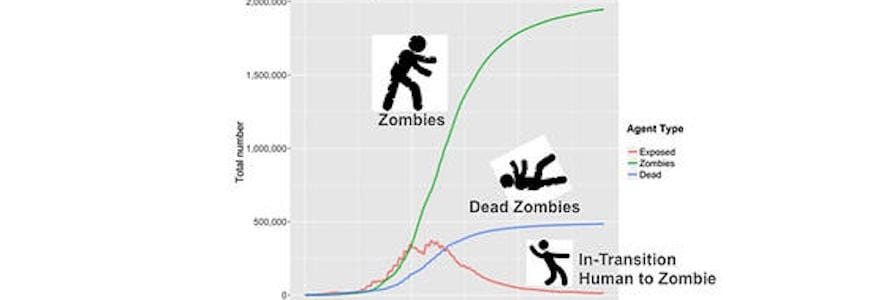By Rob Mitchum // October 31, 2016
Agent-based modeling can be used to simulate any number of complex scenarios, from the evacuation of a city after a natural disaster to the actions of the immune system after a gunshot wound. The Complex Adaptive Systems group at Argonne National Laboratory, led by CI Senior Fellow Chick Macal, is a leader in developing these models, including creating a simulation of the entire city of Chicago to test the spread of MRSA, ebola, and other diseases. Just in time for Halloween, they decided to test out an appropriately seasonal, if unlikely, epidemic — a zombie invasion.
As reported by Ben Meyerson of the Chicago Tribune, the simulation produced horrific results: within 60 days, the city was entirely overrun by more than 2 million zombies, with no humans left alive. But alternate scenarios left some hope alive for the human race, should things go fully Night of the Living Dead.
The Infectious Disease Modeling Team ran several variations of the models, though, and found there were some ways that humans could slow or stop the zombie invasion, mostly by improving defenses and using better offensive tactics.
“A small minority of computer simulation runs really gave us a lot of hope that we could affect the outcome to counter the zombie apocalypse,” Macal said. “Zombies were contained, and there wasn’t massive spreading beyond a small number of places where the zombie outbreak began. So I think there’s a lot of hope here.”
The playful experiment draws attention to the power of the group’s city model, dubbed ChiSIM, for strategizing during more realistic public health crises. For example, the research team is currently working on simulations of the Zika virus, in case the mosquito-borne disease makes it to Chicago in coming years. The study on MRSA transmission identified distinct hubs for the disease in the Chicago area, such as the Cook County Jail, where health officials can focus interventions to prevent broader spread of the drug-resistant bacterial infection.
Simulating the zombie apocalypse, goofy as it might sound, will also help researchers further refine their methods, Macal told the Tribune.
“This work allowed us to understand and do a better job for finding interventions that result in better outcomes, or even optimal outcomes — better solutions,” Macal said.
You can watch a video about the haunting results of the experiment below, and read more about the project at the Argonne website.

